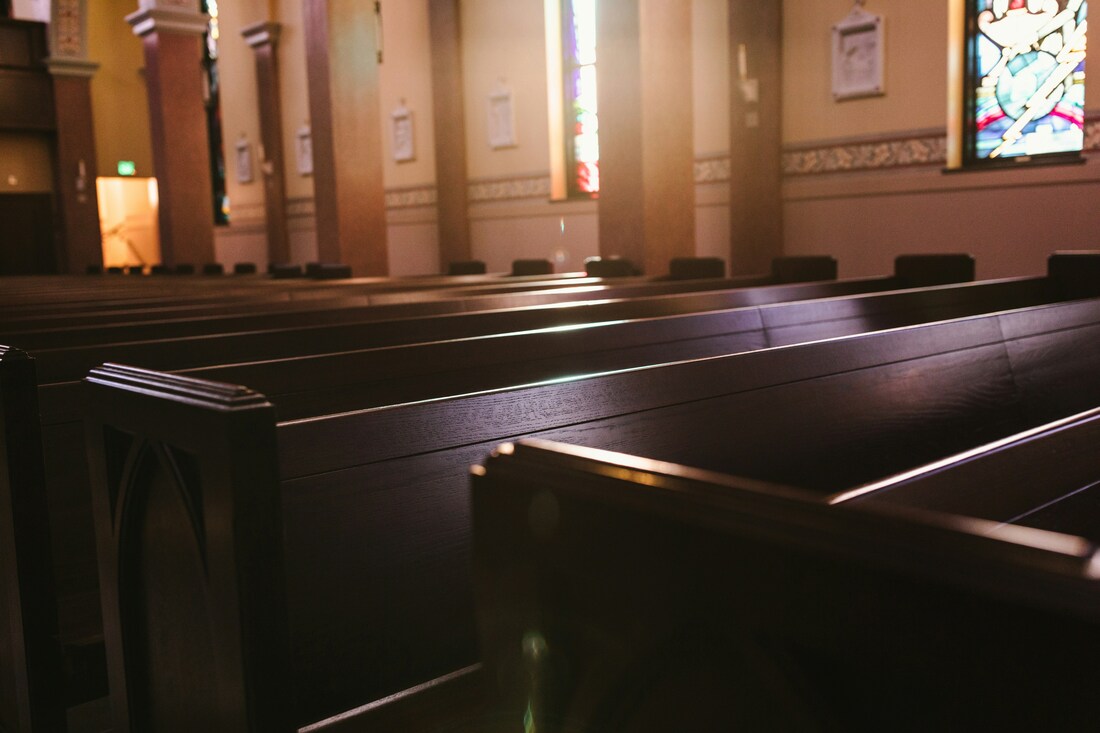 Holidays The leaves are releasing their grip and cascading to the ground as the appetite for all things pumpkin spice begins to grow strong. Many of us are no doubt preparing to harvest a large buck and all of us are anticipating the many good meals to be enjoyed over the next couple of months. We have now entered the holiday season. Of course, we have many national holidays which are scattered throughout the calendar year but the time of year generally associated with the holidays is usually commenced for most folks by the tricks and treats of Halloween. I prefer to reflect on the anniversary of Martin Luther’s nailing of the 95 Theses to the door of the church in Wittenberg, Germany over the celebration of death and darkness. However, the holiday we call Halloween is really the eve of an ancient celebration of the saints. I must admit that as a Baptist I am not well versed in the history or the traditions dealing with “ALL Saints Day” or “All Souls Day” but since today is the day I thought we could meditate on the meaning of the title “Saints.” Only Sinners Well, everyone knows that we are only sinners saved by grace, of course. Actually, no! We were sinners dead in tresspasses and sins (Ephesians 2:1-3). We were prisoners in bondage to the desires of our flesh (Galatians 5:16-17). We were slaves to the lusts and passions of our rebellious hearts but now we are SAINTS (Titus 3:3-7)! I understand and appreciate the gratitude and humility that we are expressing when we say that we are only sinners saved by grace. We want all the glory and credit to go to Christ for bearing the penalty for our sin. We want the praise and honor to go to God our Father who gave us His own Son (Romans 8:32-33) and gave us to His Son as a gift (John 6:37-40). We want blessing and reverence to go to the Holy Spirit who applied the gospel to our hearts and took up residence in our souls so that we could have true union with God. However, when we say we are only sinners, we innocently and ignorantly, actually deny God the glory for raising us up to the positional place of inheritance with Jesus (Ephesians 1:3-14)! We also rob Jesus of the credit for giving us the imputed righteous by which we become the righteousness of God (2 Corinthians 5:20-21). Lastly, we are not honoring the accomplishment of our progressive sanctification being worked in us through the power of the Holy Spirit. All Saints The term “saints” means holy ones. Some people believe that it is a special title only to be given to honor the believers who have merited it through their lives of good works. But the Bible simply uses the term to refer to believers (Hebrews 13:24-25). Christians are saints! If you are not a saint you're not a Christian. The Apostle John is clear that we do not reach a point of sinless perfection in this life, but we do grow in holiness and practice righteousness as we walk with the Lord (1 John 1:5-10). I am afraid that often we do not like to use the word saints for ourselves because we are afraid of some implicit hypocrisy. But the antidote for this is not to deny the sanctifying activity of God in our lives. Rather we must repent of any known sin and use this as a catalyst to greater growth in holy living. The Scripture teaches that we are called by God to apply the holiness given to us by the work of Christ to the transformation of our lives.(Romans 12:1-2) Even as our God is holy so we are called to be holy (1 Peter 1:13-19). So today, November 1, 2024, let’s celebrate that God, in Christ and through the Holy Spirit, has made us saints. And let us rejoice in this by seeking to encourage each other to a greater experience of righteousness, holiness, and sanctification!
0 Comments
 The Meeting Place In the Old Covenant, God instructed Moses to have a special tent that would represent His dwelling place. This would be the place that would house the Ark of the Covenant and the other holy things related to the worship of Yahweh. But, of course, God does not dwell in a tent or any kind of structure in the sense that he is somehow contained within the spatial limitation of creation. Rather, this special tent was symbolic of His habitation and provided a place to facilitate meeting with God. The Tabernacle was referred to as the “Tent of Meeting,” where Moses and the priests would go to mediate for the covenant people. In the place of God’s residence the people could seek His guidance, give thanks for His blessings, obey His instructions, bring His sacrifices and offerings, and receive His forgiveness. It became the place for mediation, substitution, and atonement. Later, Solomon would build a massive Temple to replace this special tent to be followed by another Temple rebuilt after the exile and finished in the first century. Of course, the Old Covenant Temple was destroyed in the Roman siege and destruction of Jerusalem in 70 AD by Roman General Titus. Many Christians believe that God will restore the Temple and the worship of the Jewish people in the future. But if Jesus' words on the cross are true and the mediation, substitution, and atonement was complete on the cross (John 19:28-30); then could it be that God has now provided a great tabernacle for this new covenant age? In this article, I want to consider the characteristics of the tabernacle and the parallels or fulfillments in the New Covenant. I am going to use a definition of the Tabernacle that I heard from Pastor Timothy Easley. He said, “The Tabernacle is a skin-covered, mobile, place where God and man could meet.” I believe that we will see two places where the typology of the tabernacle is reflected in the New Covenant. The first is the Lord Jesus Christ and the second is His body – the church! Skins The Tabernacle was a tent made of animal skins. Of course, animal skins are symbolic of the sacrifice necessary to deal with our sins, even as God first made covering for Adam and Eve from animal skins after the fall into sin in the garden (Genesis 3:20-21). However, this is not only a memorial but a sign pointing forward to the incarnation when the word became flesh and dwelt among us (John 1:1-18). Jesus came covered in skin and with a body of real flesh and blood to take the penalty of death for everyone who trusts in Him. The Tabernacle was meant to point to the Lord who would rip apart the veil and give all believers access to God through the veil of His flesh (Hebrews 10:1-25). But now, The Lord Jesus is ascended and seated at the right hand of the Father in glory. So where is the skin covered dwelling of God today? Well, it is the church. Not the buildings that we meet in but instead the people who have been saved by grace through faith and who have been compelled by His love! The church is the New Covenant tabernacle and temple not built with dead rocks but rather living stones (1 Peter 2:4-10)! Mobility The tabernacle was also mobile; it could move. Unlike the Temple that would come later this structure was portable. So what is the significance of the mobility of the tabernacle? First, God is not restricted to certain geographical boundaries. He is omnipresent and Lord over all creation. The Lord Jesus has authority over all of heaven and earth (Matthew 28:19-20). While in the old covenant God did make certain conditional land promises to the physical descendants of Abraham, those promises were kept and those claims were forfeited (Joshua 21:43-45). So now in this New Covenant era, the dwelling of God is not confined to a specific place but is mobile so that it may multiply and fill the earth. The dwelling of God is in the believers who carry the kingdom and the good news of our great King evangelistically into all the world. Mediation There is so much more that could be said on the above points but I want to point out one more connection. The Tabernacle was the meeting place between God and man. Because of sin, man has been separated from God ever since the garden. But God in His great love and mercy came and through Christ (Titus 3:4-7) has met us and redeemed us from the curse (1 Timothy 2:5-6) and credited us with genuine righteousness (2 Corinthians 5:20-21). So let us scatter out into the world as skin-covered, mobile, embassies of this glorious New Covenant Kingdom and our great New Covenant King!  Comprehension Reading is a vital skill for modern life. Often people will say, “I’m not a reader.” Of course, what they mean is that they do not consume books or long articles on a regular basis. However, just reading signage and navigating the normal interactions of life such as grocery shopping, doctors appointments, and work requirements engages us in reading as a tool. But even though we all use this tool everyday, for many people, their reading ability is limited to certain kinds of tasks. Fortunately, the skill of reading can be improved through education and practice. The difference between those who can use the skill of reading simply to navigate life and those who can use their reading ability to grasp more complex or abstract arguments is really about reading comprehension. Reading comprehension includes the process of decoding and using language skills to understand the words, which is a part of the skill we all use. But it goes on to apply our background knowledge and to keeping track of the connections and communication in the story or those that make up the argument. It is vital to our understanding of any text that we not only know how to read but also how to read it. We must have the background knowledge and connections to make sense of what is being communicated. This is called context. It is essential to reading comprehension and especially so with the Bible! How do you read it When a certain lawyer came to test Jesus with a question regarding the acquisition of eternal life, which led to Jesus' famous parable known as, “The Good Samaritan,” he asked the Lord, “What shall I do to inherit eternal life (Luke 10:25-37)?” Jesus answered his question with two questions, one was about the content of the Law. This is more than just the ten commandments. Jesus was asking him about what was taught in the Old Testament regarding being in covenantal relationship with God, particularly in the Torah. Of course, this is the expertise of the lawyer! He was a scholar of the Law, so Jesus is pointing out that the answer to his question about eternal life is found in the revelation of God. But Jesus also asked a second question, “How do you read it?” The revelation of God regarding righteousness, forgiveness, grace, mercy, and love is available in the pages that this lawyer has spent his whole life studying, but the issue is reading comprehension and interpretation. Jesus is asking him about the way he reads these words. Obviously, Jesus is not asking if he reads the Bible on his knees in prayer or seated at a table. Jesus is asking about the lenses that he uses to interpret the text. By lenses, I mean the set of pre-understood notions or presumptions that he is bringing to the Bible. Depending on the presuppositions that someone has they will come to different conclusions when reading a written text. When you and a close friend share an inside joke that requires you both to know the context which makes it funny, then other people who might overhear the communication do not know. So if we are to understand the Bible we must learn to let the Bible define the context and the presuppositions that we use to read the Bible. Why are there so many different groups of people who believe so many different things about the Bible when many if not most of them are attempting to read it for what it says? The answer is that they are all using different presupposed contexts to read the same book which leads to the various interpretations. The Words of Eternal Life So, how do we learn to read the Bible correctly? We must go to the words of Jesus! I am not saying that the quotations of Jesus, what are commonly referred to as the red letters, have more authority than the rest of the Bible. Rather I am saying that we should take the teachings of Jesus, who is the head of the church (Colossians 1:15-19), as the context for how to read the Bible. We should use the way that Jesus used and interpreted the Old Testament to be the model for how we should read it. We should also extend this logic to the way that the Apostles interpreted both the Old Testament and the words of Jesus because they learned their interpretive skills from the Lord Himself. So we must seek to read all the Bible according to the process and principles that we find in the inspired interpretation of the New Testament. I may have brought up more questions than answers in this post, but let’s all resolve to have the humility and diligence to be like the noble Bereans who searched the Scriptures to know the truth (Acts 17:10-12)!  The Boy King It is an amazing testimony when we witness the grace of God work upon a heart that has spent decades in rebellion against God, but then this elder person is born again as a new babe in Christ. However, it is also amazing when the Lord in kindness rescues a young child from their lost condition and brings them to saving faith early in life. The Apostle Paul when writing to his protege Timothy encourages him to not let anyone despise him because of his youth. The point is that the Lord is often pleased not only to save people when they are young but also to use them. The young person has the blessing of energy, zealousness, and optimism which God uses to great effect. In the Bible, we are told about Josiah (2 Chronicles 34). This boy became king of Judah when he was only 8 years old. To our amazement as Bible readers and amid the list of kings who did not honor God, we are told that Josiah, “did what was right in the eyes of the LORD.” What a testimony! One so young followed God, but it was the combination of a good start, a faithful life, and a peaceful end, which brought about this fitting eulogy. Repentance In the eighth year of Josiah’s reign he began to seek God. We must remember that the eighth year of his reign, which began when he was only eight, would be the year he was sixteen years old. In God’s amazing providence, He caused this young man, who saw the wickedness of his father and the depravity that they left as the common practice in Judah and Jerusalem, to begin to seek the God of his forefather David. Then in the twelfth year of his reign, which if we are keeping up means he is now twenty years old, Josiah begins to purge the land of the idols and the false places of worship that have now been in use for generations. He starts destroying the godless traditions that have not been according to God’s commandments or for His glory. This young man has become zealous to lead his people in repentance from the worship of these worthless idols. Josiah is an example of why we should be quick to heed Paul’s instruction to Timothy. We must not despise a zealous youth who is seeking to set an example of faith, love, and holy living (1 Timothy 4:11-12). Even though Josiah is young he is still faithful to the calling of God in his life. Repair But, unfortunately, we know that not everyone who begins well goes on to live a faithful life. Some people prove themselves to be rocky or thorn choked fallow ground which does not bear any good fruit (Mark 4:1-9). Thankfully, Josiah is not one of these! Instead, he continues to reign over God’s people faithfully. He begins the work of repairing the temple of God. Josiah provided for this work in 3 important ways. First, he committed the necessary financial resources to the repair and restoration of the temple. It would have been tempting to do as the kings before him had done and neglect the house of God to the benefit of his own bank account. Second, Josiah committed the necessary manpower to the task of repairing the structure. These were the best builders and craftsmen in Israel given fully to the work to rebuild the place of worship and fellowship with God! Restoration The third thing that Josiah did to complete the restoration, not only of the physical temple but of the correct worship of Yahweh, was to prepare the Levites and Priests to lead the people to worship God rightly as worship leaders, scribes, officials, and gatekeepers in the temple. In the middle of this restoration the most amazing discovery was made! They found the Book of the Law. They found the Bible! Upon reading the Scriptures Josiah was brought to a fuller understanding of the sin of his people and the need for repentance and forgiveness. He immediately seeks to inquire of the Lord concerning these things. He fully expects judgment and wrath because of the sin of his people over the generations. But God! The Lord saw Josiah's tender heart, humble spirit, and repentant faith. The Lord responds by granting peace throughout the rest of Josiah’s reign because of his faithfulness. Josiah is one of the best kings that Judah ever had, not on account of his military prowess or his diplomatic strategy or his economic genius, but because of his faithfulness to the LORD!  Example What is a church? I know that the first temptation is to begin looking for a theological definition. That is certainly important. But in this article I want to think about what defines a church for us, practically. Meaning, if someone from a non christian culture asked you, “What is a church?” How would you respond? Most of us would respond based on our past experiences. If you have experienced a very formal church life like that of the high church Lutherians or Presbyterians then you would probably define church according to that experience. However, if you grew up in a small country baptist church the picture would be very different. Additionally, a person in an urban area attending a trendy megachurch would have another understanding of church. But shouldn’t we back up and instead of getting our understanding of the church from the examples we have experienced, look to the Bible for the basic definition for what the church should look like? In this post, I am not going to give that definition but rather the criteria I believe we should use to determine a truly Biblical and practical model for church life. Explicit The first and most weighty part of the criteria should be the explicit teaching of the Bible. We should first go to those texts that directly tell us what the church is. From the Scriptures, we must understand that the church is not a physical building which has been devoted to God but rather its a spiritual building constructed from the living stones, which are the members of the new covenant (1 Peter 2:4-5). The church is not a fraternal organization but it is a fellowship meeting of faithful saints (Hebrews 10:19-25). The church is not a hierarchical governing organization, but it is a body made up of members with responsibility and accountability to one another (1 Corinthians 12). My point is simply that we must take the direct instructions from the Bible as the best authority on how we should behave in the assembly of believers (1 Timothy 3:14-15). Implicit The second way I think that we can determine what we should be doing in the meeting of the church is through the implications that we find in the Bible about the early church. There are at least three ways that we can apply this principle of implicit instruction.
Normative The third way that I believe we can identify the practical means to be applied in the church in our time and culture is through distinguishing between those things which are normative versus the things that are extraordinary. In the book of Acts, there seem to be many things which happen through the miraculous working of God that are not normative for the church. Some of the habits of the early church were more necessary than strategic. So the event of Pentecost may not be something that we should expect to be a normative means of evangelism but Paul’s practice of going to the marketplace to reason with the people might be a normative pattern to be imitated even in our day. Even if we as believers end up with some disagreements about what the church meeting looks or sounds like, we should all be able to agree that our reasons for our opinions should not ultimately be our own preferences but rather scriptural premises.  The Mighty Idolatry is a wicked sin. It is grotesque in the obvious forms of things such as new age occultism, neopaganism, and Buddhism. We also recognize that idolatry is also prevalent in the elevation of the normal activities, hobbies, and engagements of our lives to places of adoration. But one of the most offensive kinds of idolatry is when we take the things of God and make them into something to be worshiped rather than using them as the means of worship. Imagine a person who loves music so they join the church to get on the worship team so that they can perform the music they love. In this case, the person is not motivated to sing because they love God, but rather they are motivated to go through the religious necessities so that they can perform. This can also happen with adoration of people. Over the last few years and months some prominent and even conservative pastors have fallen from their place in ministry because of the discovery of disqualifying sin. In this post I do not want to dwell on those particular cases or on what would be considered disqualifying sin, but I do want to think about how we as Christians can avoid being ensnared and enslaved in sin (Proverbs 5:21-22) (2 Peter 2:17-22). Humility The first key to avoiding the trap of sin, especially the kind of seductive sin that has caused the disqualification of so many of these pastors is personal humility. We must recognize that we are in danger of committing these same sins so that we can be vigilant to guard against them. The Apostle Paul tells us that the Old Covenant Israelites’ failure to trust and follow the Lord in the wilderness when they came out of Egypt is an example for us. If those who had experienced the miraculous deliverance of God could then fall because of unbelief, then we also must be on guard against the subtlety of being tempted to attempt to live righteously but not by faith (1 Corinthians 10:1-13). In this same passage, the Lord also promises to always provide a way of escape from the temptation. But that way is always the way of faithfully trusting the Lord. We also must not be so prideful as to assume that we would not be seduced by these sinful practices given the wrong set of circumstances magnifying our weaknesses. The Bible is full of stories of some of the heroes of the faith still being captivated by sensual sexual temptation. Gratitude Another way to guard ourselves from temptation is to cultivate our gratitude for the blessing we have from God. Sin is almost always rooted in our attempt to satisfy some perceived deficiency in our lives. This perception of a deficiency is because we are not thankful for what God has given us but rather we think something more than what God has given us will make us happy. But the Lord is clear that if we seek as our highest importance His kingdom and His righteousness all the things necessary will also be provided (Matthew 6:25-34). This is the gratitude of faith that finds contentment in knowing that what God has provided is all we need. Holiness The purpose of God’s work of saving us as Christian’s is not to make us doctors in Theology or experts in exegesis, but rather holy followers who have been changed by God’s grace. This is why God disciplines us to cause us to live so as to bear the fruit of holy and righteous lives (Hebrews 12:7-11). This passage goes on to say that without this holiness no one will see the Lord (Hebrews 12:14). The greater desire for the joy of holy living is necessary to protect our hearts from the temptation to be captured by the lesser and fleeting happiness offered by sensual passions and pleasures. Brothers and Sisters, let us resolve to seek to live in holiness for both God's pleasure and ours while rejecting the cheap and empty counterfeits found in this world!  I Deserved That The other day my son Corey was assigned a writing project and he struggled for several hours with writer's block. I’m sure most of us can relate to the difficulties of this kind of creative assignment. As any good father would, I began to give him some tips about how I deal with the same type of creative problem when writing this weekly article. Wouldn’t you know it, after giving Corey advice about dealing with his writer’s block I have experienced something of my own struggle today to come up with a topic for discussion. This is not really unique. I find that almost every week as I study the scriptures to be prepared to teach and instruct our congregation that I deal in some way personally with the point of the text. I believe that this is because as believers our interaction with the Bible is not merely an academic exercise but a true interaction with the living and abiding word (1 Peter 1:23). We must remember that the Word of God is living and active so it will never suffice for a cold dead study of the pages of holy writ (Hebrews 4:12). Harvesting When it comes to gleaning truth from the Bible, it really is a matter of sowing and reaping. The more we engage with the Scriptures by reading, meditating, studying, and praying then the more we can expect to learn and grow the word that we have hidden in our hearts (Psalm 119:11). Study of the Bible is not simply about intellectually knowing the content of the various verses and passages but getting to know the word as the method of communication with the Lord who we love and who loves us. But it’s not only studying the Bible but seeking the Lord through the intimate conversation called prayer. Jesus taught us to come to the Father with a personal appeal for our very real and legitimate needs (Matthew 6:9-13). When we pray, it is not the transactional benefit of requests and answers which is actually most beneficial, but the experience of drawing near to the Lord, that is most necessary for us. Even in the church we can see that this is true. The more we fellowship and share with one another about our lives and build relationships with the brothers and sisters in our own local church the more we will be blessed by the fruit of these God ordained relationships. However, if we do not engage in meaningful fellowship and interaction in the church, but rather treat it as a religious task to be accomplished and marked off the chore list for the week, then we can expect to reap sparingly in comparison to how we have sown. Better Than I Deserve But praise God, we do not only receive the portion expected but when we seek the Lord His blessings are abundant. Do you remember in Jesus’ parable about the talents, how he said that to “everyone who has even more will be given but to the one who has not even what he has will be taken away”(Matthew 25:14-30)? In this text, Jesus is pointing out just how abundant the blessings are for those who are truly following Him. Of course, the point is not about monetary wealth but rather the spiritual riches that are stored away in heaven free of corrosion, corruption, or crime (Luke 12:33-34). Most importantly, as those who have been recipients of God's grace in Jesus Christ we are always living lives that we know are better than we deserve. Not only now but we possess a hope for eternal life which is promised to us by our God how is truth itself (Titus 1:2).  Stop It! I saw a list of the famous people who have died this year. Among the many people familiar to people of my generation and before was Bob Newhart. One of the comedic bits that he was well known for was that he would play a psychiatrist who would listen intently and patiently to the problems of the patient then would calmly tell them that he had the solution for their problem. Then he would scream, “Stop It!” This week there was a debate between Donald Trump and Kamala Harris. I watched about fifteen or twenty minutes of it until I couldn’t bear it anymore. During the portion that I watched, I wanted to say to both candidates, “Stop it.” It really isn’t accurate to call the political fiasco that these presidential meetings have become “debates.” They are not debates, where policies and issues are put forward to the voters, but rather a mixture bashing one another and bragging on their perceived or fabricated personal accomplishments. Witnessing the depraved nature of modern politics stirs up several genuine emotions. First, it kindles real anger at the selfish and silly behavior of both candidates while so many truly important and consequential issues are at stake. Secondly, it grieves me to see the evil that is being promoted and celebrated (more on this below). Most of all, this display prompts fear. But not fear of the government or societal collapse but rather a holy fear of God. We, as a nation, need to fear God and turn to Him in reverent awe of His holiness and justice, in humble and genuine repentance, while pleading for His merciful kindness, glorious graciousness, and steadfast love to be poured out on our land. Woe As I listened to the candidates hurl their insults and spew lies back and forth one text of scripture kept coming to mind. This text was especially clearly demonstrated during the several times that Vice President Harris said that restrictions on abortion were “immoral.” No, Madam Vice President, abortion is immoral! President Trump isn’t much better repeating over and over that abortion should be ok in the cases of the exceptions. But abortion is murder and murder is always immoral. So what is this Bible text that seems so relevant? Isaiah 5:18-23 18 Woe to those who draw iniquity with cords of falsehood, who draw sin as with cart ropes, 19 who say: “Let him be quick, let him speed his work that we may see it; let the counsel of the Holy One of Israel draw near, and let it come, that we may know it!” 20 Woe to those who call evil good and good evil, who put darkness for light and light for darkness, who put bitter for sweet and sweet for bitter! 21 Woe to those who are wise in their own eyes, and shrewd in their own sight! 22 Woe to those who are heroes at drinking wine, and valiant men in mixing strong drink, 23 who acquit the guilty for a bribe, and deprive the innocent of his right! I think that the examples in the debate are so obvious and plentiful that I will simply move on to some points from the text. Notice that the first woe is perversity being promoted with lies. That is what is meant by the phrase “draw iniquity with cords of falsehood.” In the debate, it was not just the candidates but even the moderators and media who cared more about their agenda than they did about truth. But verse twenty is the most obvious part, as evil things (even the murder of unborn infants) are called “healthcare” while restricting these moral atrocities is called “immoral.” Even with all the stage lighting in the world this debate was as black as a moonless midnight sky. While both candidates were hoping to wield words that would be sweet to the ears of voters, the bitter vitriol was clear for anyone with ears to hear. Finally, verse twenty one clearly denotes the danger for those full of pride. Unfortunately, our modern political process is dominated not by humble confidence but by arrogant hubris. Speak Up So what should we do in light of all this evil and vicious speech? We must instead speak the truth in love (Ephesians 4:15-16). We must not shrink back (Hebrews 10:32-39) from declaring the truth of the moral instructions given in God’s law and demonstrated by the perfect life of Jesus Christ (Romans 3:19-26). Also, we must continue to proclaim the greatness of the gospel of Jesus Christ. The only hope of our country or our world is faith in Jesus Christ!  Rough Some things are just hard. Everyone goes through things that are difficult. Unfortunately, many people miss the times of blessing because they are always focusing on the negative things that have happened or they are worried about what will happen next. Oftentimes, we get trapped into a pattern of categorizing everything that happens as either good or bad. However, the truth is that if we truly believe that God is in control and that God has a wise and ultimately good plan for us as His people, then we must seek to understand the purpose behind everything that God brings or allows in our lives. The Will of God This last Sunday, Matthew brought such a good message to us from 1 Thessalonians 4:1-8. As we considered this text, my mind and heart was captured by verse 3 which says, “For this is the will of God, your sanctification.” I have often thought about discerning God’s will as trying to figure out the particular choice or decision that He would want for me to make. As a result I was always assured that making the “right” decision would obviously lead to a better, easier, more pleasurable outcome. But even as I write this, I hope you can see the subtle form of prosperity gospel hidden in this kind of thinking. The flaw in my thinking has to do with the assumption that what God desires for us is our pleasure and happiness. We probably project this on to God because we desire for ourselves pleasure and happiness. But thinking about this verse helps me to understand that what God wills for me is my sanctification. Sanctification simply means that God wants us to be holy (1 Peter 1:14-16). But if holiness and not happiness is at the heart of God’s will then maybe the methods and mechanics that He chooses may look different than the pleasure and ease that I had assumed. Hard things and difficult circumstances are not merely tolerated by God for a season but ordained by God for our sanctification. The Word of God But someone will say, “didn’t Jesus pray to the Father that His followers would be sanctified in the truth which is God’s word?” The answer to that is yes (John 17:17). Jesus knew that to be sanctified believers needed the pure truth of the Word of God. But we not only need to know the truth of these doctrines but we need to obey and observe them (Matthew 28:19-20). The reality is that God has not called us to merely know the truth but to believe it. But to genuinely believe it means that our actions must be conformed to it (Romans 12:1-2). The Work of God But be assured, I am not saying that this is to be accomplished in our own puny strength. Rather, the Scripture teaches that our sanctification is the work of God. When Paul was writing to the Philippians concerning this very issue of the Christian’s sanctification he was clear that our working out of our salvation is the result of God working in us according to what pleases Him (Philippians 2:12-13). The Point of this article is that God will many times use even painful hardships to refine us as believers. Iron sharpens iron because of the hard and abrasive friction. In the same way God uses hard things to strengthen and sharpen His people (Proverbs 27:17). Ultimately, we must conclude that if God has begun the good work in us by bringing us to Himself (Philippians 1:6) then it will be continued in our growing sanctification toward the final glorification promised by God.  Popular I think that I have lived through three cycles of country or western style being popular. When I was child in the eighties, Barbara Mandrell had a popular song called “I Was Country When Country Wasn’t Cool” which I guess pointed at a boost in popularity at that time. But, the first time that I recognized this phenomenon was in the early 1990’s. I call this the 8 seconds of the pure country era. Rodeo, and especially professional bull riding, was becoming more popular with the Bull Riders Only tour then later the PBR. Musical artists such as Garth Brooks, George Strait, and Reba McEntire were among the largest celebrities in the world. Hollywood was producing blockbuster movies such as 8 Seconds, Pure Country, and Tombstone. All of this was because even people who were not themselves residents of rural areas or involved in farming and ranching lifestyles were attracted to the form and the fashion. The second period that I will point to is the middle to late 2000’s. This was less broad and impactful but in this timeframe country and western styles became even more mainstream. Many artists from popular shows such as American Idol chose to go into country music rather than the pop genre. RFD TV and other media outlets were catering to the market. This could probably be called the millennial era of popularity. The latest era that I have noticed is actually happening right now. I called this the Yellowstone Era. It is not just the popularity of the show but the accessibility of social media. Figures like Dale Brisby, and thousands of other accounts, are making the everyday exploits and shenanigans of the rural and ranching lifestyle entertaining and publicized. My point is that this is not just true with regard to Country as a genre of music or style of apparel. Rather this is true of many other things in our lives. There is an ebb and flow to the seasons of our lives and to the interests and focus of our society. Yet, we are what remains genuine throughout these seasons. Remember Barbara Mandrell’s song from earlier? Those who can look back and see that during these periods they bought a pair of boots or a straw hat but only for those periods of popularity aren’t really country people. Just like someone might buy some JNCO jeans and go to Ska or heavy metal concerts in college but they don’t continue in that lifestyle. What is really true is how the person lives their life over time, not just caught up in a style for a season. This can also happen spiritually. Many people cycle through different spiritual beliefs without establishing bedrock principles and a source from which to anchor their soul. In this condition, they become easily swayed about by every new teaching. In this text (Ephesians 4:11-14), the Apostle Paul is calling on believers to grow up into maturity. I don’t want to sound like the cranky old man blaming everything on youth, but we can see that often these culture swings are closely associated with youth culture. So often, these movements among larger populations in terms of spiritual beliefs also happen among younger demographics. But as people who have come to trust in Christ we do have an anchor for the soul which is our hope in Christ (Hebrews 6:19-20)! Also, we do have a source for truth and reality which is the word of God (2 Timothy 3:16-17). Paul also dealt with something like this phenomenon when he proclaimed the gospel to the pagan culture of Athens. They, much like our modern culture, had an insatiable appetite for that which is novel and alternative (Acts 17:21). So what did Paul do in this environment? He proclaimed who God is, as Creator, Ruler, Judge, and Savior! So many styles, fashions, and cycles may come and go but eternity is founded on the rock and the rock is Christ (1 Corinthians 10:1-4)! So today, if you are separated from God by the guilty of your sin, don’t remain there because of unbelief but rather trust in Jesus and be secured in your soul! |